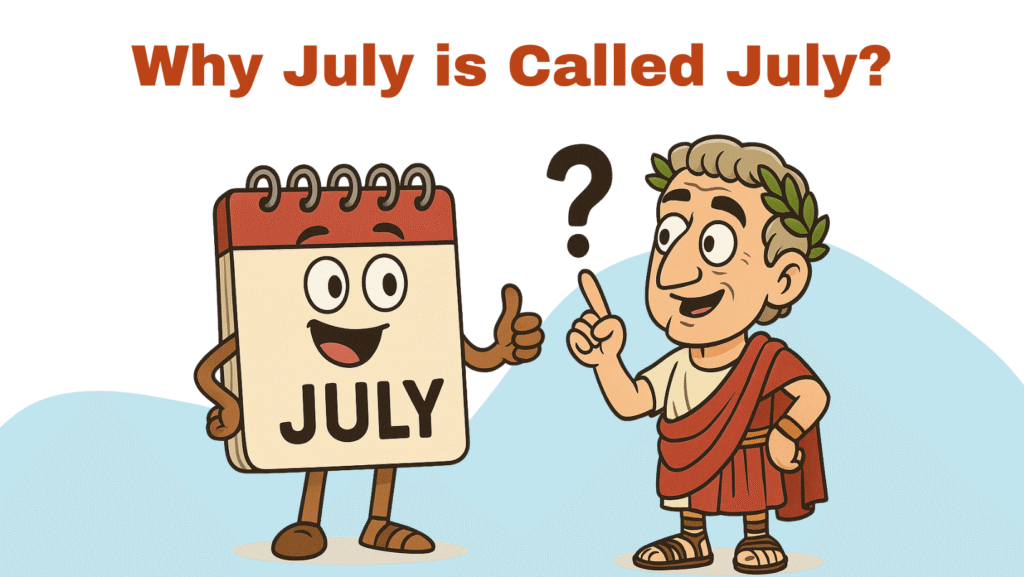
Why call it “July” & not “Sunblaze?
Ah, July—the month of sizzling sidewalks, melting ice cream, and explosive fireworks. But have you ever stopped mid-sweat and asked yourself:
Why “July”?
Why not something a bit more honest—like Sunblaze, Heatwave, or even Hotmama?
It could’ve been Solarchella, Grillfest, or even Sweatember.
But no—it’s July.

🏛️ Blame Rome, as Usual
And it all started with one Roman man, his time-obsessed ego, a calendar in crisis, and—oh right—a dramatic assassination.
This is not just the story of a name. It’s a story of power, legacy, and how one guy basically rewrote time so that even your iPhone calendar still says his name.
Welcome to the wild Roman origin story behind your favorite sweaty month.
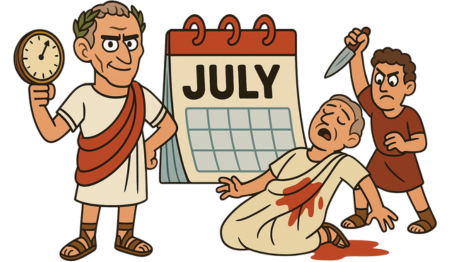
Enter Julius: The Man, the Myth, the Month
Let’s get one thing straight:
Yes, you’ve heard of Caesar—but this isn’t the mascot from your $5 pizza box.
We’re talking about the real Julius Caesar: general, reformer, calendar nerd, and one of the most influential egos in world history.
If you don’t know much about him, buckle up. Because this isn’t just a history lesson—it’s the reason your entire year looks the way it does. And yes, he totally has a month named after him.

📆 The Calendar Was a Hot Mess
Before Caesar came in swinging with his reforms, the Roman calendar was… a disaster. It started in March, had only ten months, and completely ghosted winter. January and February? Not even invited.
Just ten months, winter left on “seen,” and names that sound more like a numbered list than a vibe.
It was so out of sync with the seasons that farmers couldn’t plan, priests couldn’t predict festivals, and politicians just fudged the dates whenever it suited them.
Think: chaotic Google Calendar but in Latin. Let’s rewind and meet the months before July was even a twinkle in Julius’ eye.

📅 The Early Roman Calendar: A Ten-Month Year
The earliest Roman calendar, attributed to Romulus (the legendary founder of Rome), had only ten months. The calendar year began in March, not January! Here’s a rundown of the months and their names:
| Month | Latin Name | Meaning/Origin |
|---|---|---|
| March | Martius | Named after Mars, god of war. The new year kicked off with battle season. |
| April | Aprilis | Possibly from aperire (“to open”) — think flowers, buds, spring vibes. |
| May | Maius | Named after Maia, goddess of growth and fertility. Mother Earth’s favorite month. |
| June | Iunius | Honors Juno, goddess of marriage and protector of women. |
| July | Quintilis | Literally means “fifth.” Later renamed Julius to flatter Caesar’s ego. |
| August | Sextilis | “Sixth” in Latin. Renamed Augustus because emperors love trophies. |
| September | September | From septem, meaning seven. Simple math. |
| October | October | From octo, meaning eight. (Back when it made sense.) |
| November | November | From novem, meaning nine. |
| December | December | From decem, meaning ten — and the end of the line in the OG calendar. |
🕳️ The Missing Months: Rome’s Awkward Time Void
So what happened after December in the old Roman calendar?
…Absolutely nothing.
Yep, there was a weird, murky 60-day gap—no months, no structure, just a free-floating stretch of time where the year sort of… paused. It was like Rome collectively forgot how calendars work during winter.
No one really knew what to do with it. Some years, priests would wedge in bonus days or invent “intercalary” months on the fly—kind of like ancient calendar duct tape. It was chaotic, confusing, and very Roman.
Basically, it was like saying, “We’ll deal with winter later.” Spoiler: They didn’t.

🛠️ Caesar Fixes Time (Because of Course He Did)
In 46 BCE, after years of watching time spiral into disarray, Caesar stepped in and said, “Let there be order.” He wasn’t just playing emperor—he brought in top Egyptian astronomers (big shoutout to Sosigenes of Alexandria), studied the solar year, and dropped the Julian Calendar, like a mic.
He brought in astronomers, studied the solar year, and rolled out the Julian Calendar:
- 365 days
- Leap year every 4 years
- 12 actual months (January and February finally got their moment)
This new calendar was so effective, it stuck for over 1600 years—until Pope Gregory gave it a few tweaks in the 1500s (but that’s another drama).
It was a major improvement, making it easier to keep track of seasons and plan agricultural activities. Imagine Caesar proudly declaring, “Let’s fix this calendar and make it fabulous!”
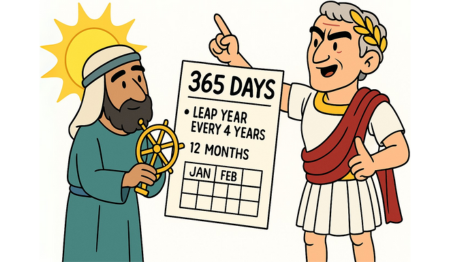
From Quintilis to Immortality
The fix: A year = 365 days. Add a leap year every 4 years. Insert January and February at the beginning of the year. Align everything with the sun instead of random lunar guesses.
But Caesar wasn’t done just yet. Fixing the calendar was one thing—cementing his place in it? Now that was legacy.
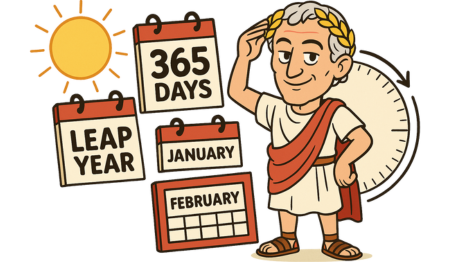
🌞Why “July” and Not Just “Caesar”?
You might be wondering: if they wanted to honor Julius Caesar, why didn’t they just call it Caesar?
Well, for starters, “Caesar” was already becoming more than just a name—it was evolving into a title. Kind of like “Pharaoh” or “Boss of Rome.” Naming a month Caesar might’ve sounded a bit too imperial, a bit too… heavy. Like turning your calendar into a political campaign.
“Hey, what are you doing in Caesar?”
“Just trying not to get assassinated.”
“July,” on the other hand, is a Latinized version of Julius, Caesar’s given name, and it had a more elegant, seasonal vibe. It was personal enough to feel like a tribute, but subtle enough not to scream dictatorship.
Plus, let’s be honest—“July” just vibes better with sunshine, barbecues, and pool parties than “Caesar” ever could. Imagine saying, “It’s finally Caesar—let’s hit the beach!” Yeah… no thanks.

Julius, Time Architect
Flip open any calendar, and there it is—July. Not just a nod to summer, but to a man who remapped time itself.
Julius Caesar didn’t just tweak dates—he designed a system so solid that it guided the world for over 1,600 years.
So when you’re timing your vacation, counting down to a birthday, or marking off days till the weekend, you’re still playing by Caesar’s rules.
Pretty good for a guy who just wanted to stop time from ghosting winter. Oh, and his successor Augustus? He saw that and said, “Hold my laurel wreath,” renaming Sextilis to August. Because emperors gotta emperor.
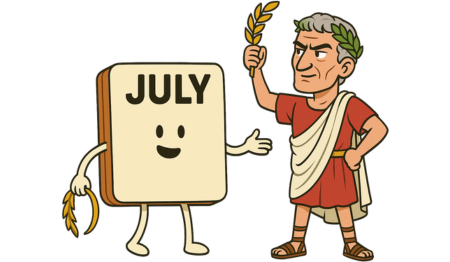
☀️ So… What’s in a Month?
As it turns out, quite a lot. July isn’t just a block of 31 hot days—it’s a historical tribute, a political shout-out, and a cultural dance party all rolled into one.
From Caesar’s bold calendar fix to fireworks lighting up the night sky in three continents, July proves it has range. It’s the only month named after a man who reprogrammed time itself—and still managed to get stabbed 23 times by his coworkers.
So the next time someone asks what month it is, don’t just say “July.” Say it with the confidence of a Roman general, the flair of a revolutionary, and the rhythm of a Peruvian street parade.
Because July isn’t just a name. It’s a legacy.

Global Celebrations in July
July is more than just a name—it’s a month filled with global celebrations!
• United States: Independence Day on July 4th honors the nation’s founding with fireworks, parades, and patriotic festivities.
• France: Bastille Day on July 14th marks the start of the French Revolution, symbolizing freedom and democracy.
• Latin America: Peru celebrates Fiestas Patrias on July 28th and 29th with parades and cultural events, while Brazil’s Festas Juninas often extend into early July, featuring traditional dances and community celebrations.
Julius got his month — but how do other countries say his name without choking on it?

🌍 Everyone’s Saying July — But Make It Global
So Julius got his month. Cool flex. But what happened when the rest of the world had to say “July”?
Spoiler: not everyone just went Julius but make it English.
Let’s take a little linguistic world tour and see how different languages decided to honor (or butcher) his name — some kept it classy, others got creative, and a few just said, “nah, we’re calling it something else.”
| 🌐 Language | 🗣️ Word for July | ✏️ Notes |
|---|---|---|
| French | juillet | Looks fancy, sounds like you’re trying to summon a croissant. |
| Spanish | julio | Rolls off the tongue like the name of a guy who brings guitar to the beach. |
| Italian | luglio | Because Italy always needs to throw in extra flair and a ‘g’. |
| Portuguese | julho | Sounds like you’re sneezing in reverse, but dignified. |
| German | Juli | Efficient. Minimal. Possibly designed by engineers. |
| Polish | lipiec | Wait, what? Yeah, they do their own thing. It means “linden tree month.” Nature vibes. |
| Russian | июль (iyul’) | Cyrillic swag. Still Julius deep down. |
| Chinese | 七月 (qī yuè) | Literally “seventh month.” Straight to the point. |
| Japanese | 7月 (shichi-gatsu) | Same minimalist energy. Calendar, but make it Zen. |
| Korean | 7월 (chil-wol) | Still the seventh month. Consistent and unbothered. |
| Greek | Ιούλιος (Ioúlios) | Julius in toga form. Classic with olives. |
| Turkish | Temmuz | Based on the ancient Mesopotamian god Tammuz. Yup — plot twist. |
| Hindi | जुलाई (Julāī) | Sounds familiar, with Devanagari realness. |
| Arabic | يوليو (Yūliyū) | Looks regal, rolls like “Julius” in slow motion. |
🧠 Bonus Thought:
Language doesn’t just translate — it transforms. Julius Caesar may have wanted eternal glory, but in the end, he also became a beach month, a school holiday, a barbecue date… and a pronunciation challenge across continents.
Not bad for a guy who just wanted to fix the calendar. So if one man can rewrite time, imagine what a whole empire did.
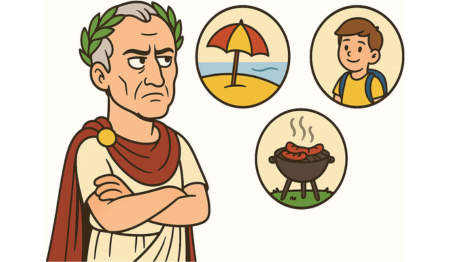
Why julio Hits Different
In Spanish, it’s julio — same month, but now it sounds like your hot neighbor with great hair. Yeah! In Spanish Julio is also a guy’s name — same as Jesus.
Spanish doesn’t just change how you say things — it changes how you feel them. In today’s globalized world, knowing Spanish means more than just translating. It’s being able to connect in over 20 countries, enjoy a richer Netflix queue, flirt across borders, and understand the jokes without subtitles.
It’s culture, it’s opportunity, and yes — it’s a little bit of a superpower. And you don’t need to cross an ocean or wait for Caesar’s ghost to start learning it.
Let’s dig into how all the months got their names — and the drama behind them.

The Origins of Month Names
Ever wondered why we call the months what we do? Dive into our blog, “Months & Days”, for a fun and fascinating look at the origins of month names. It’s like a time-travel adventure through history, with all the juicy details and quirky facts you didn’t know you needed! Romance in Spanish? Turn Up the Heat!

Spanish Romance
Looking to add a little spice to your Spanish? Check out our blog, “Things Spanish People Say in Bed”, for a playful selection of romantic phrases that’ll make your conversations sizzle. And if you’re ready to go bold, explore ‘El Sexi Chupacabras’ for even hotter expressions and sexy vocabulary. Learn how to say “I love you” and much more with flair! Want more?

Legendary Myths & Legends
Got a taste for the mythical and mysterious? Our ‘Legends & Folktales‘ section is your gateway to enchanting stories featuring mythical beings like la Santa Muerte, la Llorona, la Ciguapa, and the infamous El Chupacabras. Discover the rich tapestry of Hispanic folklore and let these legends captivate your imagination.

Laugh and Learn
Feeling like a laugh while you learn? We’ve got you covered! While phrases like ‘¡Feliz Año Nuevo!’ or ‘¡Me Gusta la Chucha de tu Madre!’ might tickle your funny bone, we’re all about respectful and engaging language learning.

🌍 Geopolítica en Español
In a world where headlines cross borders in seconds, learning Spanish isn’t just about grammar — it’s about getting the full story. This section dives into global affairs from a Spanish-speaking lens, helping you connect language with power, culture, and international events.
Whether you’re brushing up your vocab or decoding diplomacy, this is where Spanish meets the real world.
Check out our ‘About’ section to see what fuels our passion for teaching, and don’t miss out on the free lessons at Kasa de Franko!
Wait! Wondering what’s Kasa De Franko: Your Spanish Learning Wonderland?

Discover Kasa De Franko
Curious about Kasa De Franko and KiDeeF Spanish? At KDF, we offer flexible, enjoyable, and affordable Spanish lessons for all ages. Our polyglot founder, Franko, brings deep knowledge and a love for both language and culture to every class. Wanna try it out?

Free Spanish Classes
Ready to embark on your Spanish journey? Visit Kasa de Franko, your ultimate cultural and linguistic oasis. Sign up for a free class today and dive into a world of history, language, and culture. Hit that red button and get started on your adventure! And remember…

